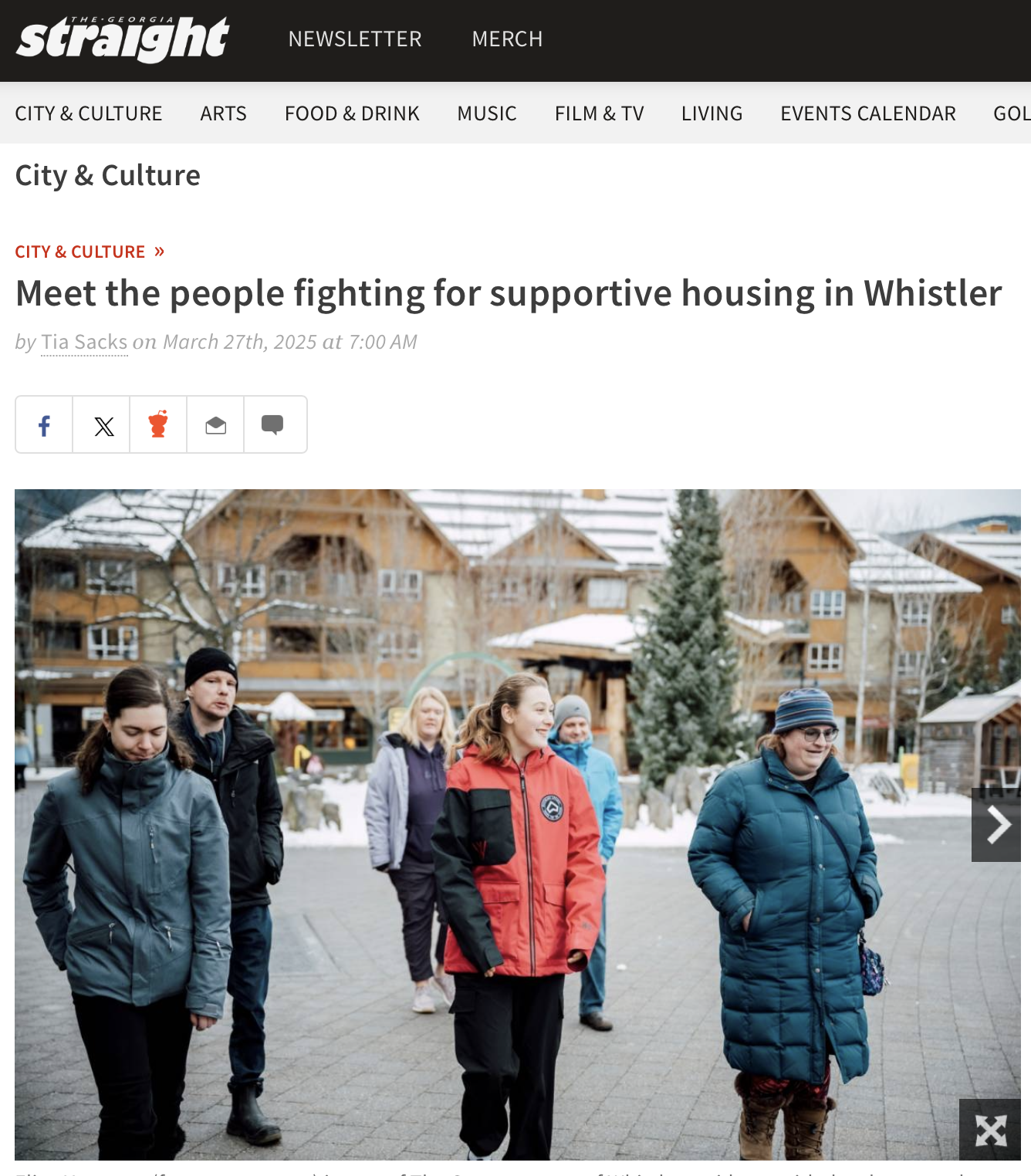
The Gang gathers in Whistler every week. The group is made up of about a dozen people from 18 to 53 years old, all with developmental disabilities. And though their needs vary, they share a common dream: keys to their own homes.
If they lived in Vancouver, they would be eligible to move into one of the half-dozen existing independent supported living complexes which offer long-term, permanent homes. In tourist-drenched Whistler, permanent population 15,000, there are none.
Independent-supported living complexes enable adults with developmental disabilities to live independently from their families while receiving necessary personalized support and supervision. They are private ventures run by nonprofits, often with support from Community Living BC; a government agency which helps subsidize housing and caregiving for adults with developmental disabilities.
Sue Hargrave understands the need for supported living. Her 18-year-old daughter Eliza has cerebral palsy, ADHD, and global developmental delay. Looking after her full-time at home is difficult, but she would struggle to live by herself.
“A lot of people will say, ‘This population doesn’t have the ability to live alone so let’s just group them all together,’” Hargrave says. “Well, that’s what we used to do. And it’s called an institution.”
“I don’t always want to live at home,” Eliza adds over email.
Supported living would be perfect for Eliza—if such a solution existed in Whistler.
“They just want to be as normal as possible,” Hargrave explains.
Concerns like this led Hargrave and a handful of the Gang’s moms to get together five years ago and come up with the idea for Whistler Independent Supported Housing Society (WISH). The society’s goal is to create an apartment complex with live-in caregivers and daily programming: a big ask in what is, according to a recent ranking by global real estate company Engel & Völkers, the most expensive ski town in Canada.
“We’ve had families that have moved out of Whistler in the past because they didn’t have the support for their loved one, and they said to us, ‘If you guys build this, we’ll move back,’” says Hargrave. WISH already has about 10 people, she adds, that would “move in yesterday.”
One of them is a 53-year-old man whose single mother is in her 80s. The senior is considering moving so her son has access to a home, even though the family has lived in Whistler for decades.
“She says, ‘What’s gonna happen when I’m gone?’” Hargrave explains. “She would lose all of her friends, all of her connections.”
Danielle Winkle, a 40-year-old woman in the Gang, also dreads the possibility of leaving Whistler.
“I would not be comfortable with that,” she says.
Living in the ski town is a core part of her identity. With her friend group, she loves to snowshoe in the winter, and spends summers canoeing and hiking multiple times a week.
Living in an apartment paid for by her parents and close to her family has enabled Winkle to live independently with nearby support. However, not every family can afford that, and not every member of the Gang can live fully independently.
For its vision to become a reality, WISH must raise $5 million. Right now, it has raised $30,000 through donations, grants, and fundraisers. WISH also needs land.
Whistler owns property zoned for community housing, but the municipality’s recent housing report stated there is “little data” to assess the demand for supportive housing. That means WISH must first convince the town to conduct research. If the municipality doesn’t offer land, WISH may have to work with a private developer.
Two Vancouver-based independent living projects could offer WISH a roadmap. HYAD Place, a non-profit, received donated land from the city in 2010 and $5.1 million in provincial funding. The other, PASS PALS Adult Services Society, partnered with a developer who built community housing, and fundraised $3 million to invest in a local foundation. The interest generated from the investment subsidizes rent for its 15 residents indefinitely.
Casey Cochran, a 45-year-old resident of PASS, says in the three years he has lived there, the housing has given him independence and community.
“We go out as a big group of people and we see a movie or go to a pool; we do a lot of different activities,” he says. “It’s a great community.”
WISH is exploring both options, but needs the project done as soon as possible.
“Neighbours will pull me over on the street,” Hargrave says, “and they’ll say, ‘Of course we should be donating money to WISH. Your individuals can’t live [here], and what they have now is not sustainable.’”
There is still work to be done to show people that living independently is as important to the Gang and others like them as it is to any adult. Until then, WISH will remain a wish.
Source: https://www.straight.com/city-culture/meet-people-fighting-for-supportive-housing-in-whistler
